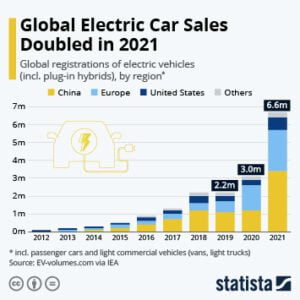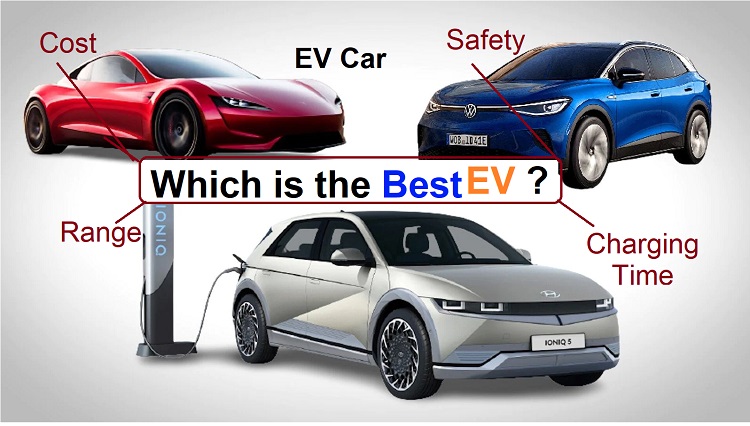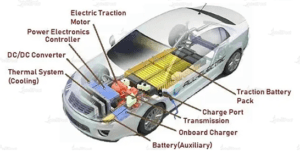Introduction EV car
- An electric vehicle (EV) is an automobile powered by electricity instead of traditional internal combustion engines that run on fossil fuels like gasoline or diesel. EVs use electric motors and rechargeable battery packs to propel the vehicle and provide power to various systems.

- EVs have gained popularity due to their potential to reduce greenhouse gas emissions, lower dependence on fossil fuels, and contribute to a cleaner and more sustainable transportation system.
Advantages of EV Car
- They offer several advantages over conventional vehicles, including:
-
- Environmental Benefits
- Energy Efficiency:
- Lower Operating Costs
- Quiet and Smooth Operation:
- Government Incentives:
- Advancements in Technology:
- EVs come in various forms, including all-electric vehicles (AEVs) that rely solely on electricity for propulsion and plug-in hybrid electric vehicles (PHEVs) that combine an electric motor with an internal combustion engine.
- AEVs are solely powered by electricity and require charging from external sources, while PHEVs can operate using electricity or gasoline, offering increased flexibility.
- It’s important to note that the availability of EV models, charging infrastructure, and government incentives may vary depending on the country or region. However, the growing adoption of EVs is driving advancements and expanding the options for consumers interested in embracing electric mobility.
Parts of EV cars
Electric vehicles (EVs) consist of various parts and components that work together to power and operate the vehicle. Here are some key parts commonly found in EVs:
- Battery Pack:
- The battery pack is a crucial component of an EV, providing the energy storage needed to power the electric motor.
- It usually consists of numerous individual battery cells, typically lithium-ion, connected together to form a pack.
- Electric Motor:
- The electric motor is responsible for converting electrical energy from the battery into mechanical power to drive the wheels.
- It eliminates the need for a traditional internal combustion engine found in gasoline-powered vehicles.
- Power Electronics:
- Power electronics components, such as inverters and converters, control the flow of electricity between the battery pack, electric motor, and other vehicle systems.
- They ensure efficient energy conversion and management.
- Onboard Charger:
- EVs have an onboard charger that converts alternating current (AC) from a charging station or home charging point into direct current (DC) to charge the battery pack.
- The charger regulates the charging process and ensures the battery is charged safely.
- Thermal Management System:
- EVs have a thermal management system to regulate the temperature of the battery pack, electric motor, and power electronics.
- This system helps maintain optimal operating conditions for efficiency, performance, and longevity.
- Regenerative Braking System:
- EVs utilize regenerative braking to recover and store energy during deceleration and braking.
- This system converts the kinetic energy of the vehicle into electrical energy, which is then stored in the battery for later use.
- Charging Port:
- The charging port is where the EV is connected to a charging station or a home charging point.
- It provides the interface for transferring electricity to charge the battery pack.
- In-Cabin Components:
- EVs have similar in-cabin components as traditional cars, including the dashboard, steering wheel, seats, infotainment systems, HVAC (heating, ventilation, and air conditioning), and safety features.
- Auxiliary Systems:
- EVs also have auxiliary systems such as lighting, power windows, power locks, and other electronic features found in conventional vehicles.
- It’s important to note that the specific parts and components of an EV can vary depending on the make, model, and manufacturer. Additionally, EV technology is continually evolving, and new innovations may introduce new components or improve existing ones.

How to Select the Best EV Car
Selecting a four-wheeler electric vehicle (EV) involves considering various factors, similar to selecting a traditional gasoline-powered car. Here’s a step-by-step guide to help you choose the right EV:
- Determine your needs:
- Consider your daily driving habits, including the average distance you travel, the number of passengers you usually carry, cargo space requirements, and the type of terrain you encounter.
- Understanding your needs will help you narrow down your options.
- Set a budget:
- Determine how much you’re willing to spend on an EV.
- Keep in mind that EVs generally have a higher upfront cost than their gasoline counterparts, although they can be more cost-effective in the long run due to lower fuel and maintenance costs.
- Research available models:
- Investigate the EV market to find models that meet your requirements.
- Consider factors such as range (the distance the vehicle can travel on a full charge), charging infrastructure in your area, available tax incentives or rebates, safety features, and overall performance.
- Compare range and charging options:
- Evaluate the range offered by different EV models to ensure it meets your daily driving needs.
- Consider the availability of charging stations in your area, both at home and in public locations. Look for EVs that offer fast-charging capabilities if you frequently take long trips.
- Consider battery capacity and efficiency:
- Battery capacity affects the range of an EV, so consider the size and efficiency of the battery pack.
- Larger battery packs generally offer a longer range, but they may also increase the vehicle’s cost and weight.
- Look for models with efficient energy usage to maximize the range.
- Assess performance and features:
- Look into the acceleration, handling, and overall performance of the EVs you’re considering.
- Check for features like regenerative braking, advanced driver-assistance systems, infotainment options, and comfort features that align with your preferences.
- Read reviews and seek expert opinions:
- Read reviews from reputable sources, watch video reviews, and seek opinions from EV experts or current EV owners.
- They can provide valuable insights into the pros and cons of specific models, helping you make an informed decision.
- Test drive:
- If possible, visit dealerships or EV showrooms to test drive the models you’re interested in.
- This will give you a firsthand experience of how the vehicle handles, its interior comfort, and overall driving experience.
- Consider charging infrastructure:
- Evaluate the availability of charging stations in your area and along your commonly traveled routes. Check if the vehicle comes with compatibility for home charging or if you need to make any additional arrangements for charging equipment.
- Evaluate ownership costs:
- Consider the long-term costs of owning an EV, including maintenance, insurance, and potential battery replacement costs. Although EVs generally have lower maintenance costs, be sure to factor in any unique expenses associated with EV ownership.
- Make a decision:
- Once you’ve weighed all the factors, compare your options and make a decision based on your needs, budget, and the overall value each model offers.
Best EV cars in the World
- Remember to check the latest information on EV models, as the technology and market are continually evolving.best” four-wheeler EV car can vary depending on individual preferences, needs, and budget.
- However, here are some popular and highly regarded EVs that have received positive reviews:
Tesla Model 3
- The Model 3 offers impressive range, excellent performance, and a sleek design.
- It comes in various configurations and has received praise for its cutting-edge technology, including Autopilot features and over-the-air software updates.
- The Tesla Model 3 was first introduced in 2017.
- It is one of the most popular electric cars on the market and has been praised for its performance, range, and features.
- The Tesla Model 3 is available in three different models: Standard Range Plus, Long Range, and Performance
- Features:
- The Standard Range -f 267 miles,
- Long Range – 358 miles
- Accelerate from 0 – 60 mph : 5 seconds
- The cost starts from $46,990.
Nissan Leaf:
- The Nissan Leaf is one of the best-selling EVs worldwide. It offers a comfortable ride, a decent range, and a practical hatchback design.
- The Leaf is known for its affordability and has been available in the market for several years, making it a reliable choice.
- The Nissan Leaf is a popular electric car that has been on the market since 2010.
- It is a practical and affordable car that offers a range of up to 226 miles on a single charge. The Leaf is also equipped with a variety of features that make it a safe and enjoyable car to drive.
- Here are some of the features of the Nissan Leaf:
-
- Electric motor with 147 horsepower and 236 lb-ft of torque
- 40 kWh battery pack
- Up to 226 miles of range
- 110 kW DC fast charging
- ProPILOT Assist driver assistance technology
- 7-inch touchscreen infotainment system
- 6-speaker sound system
- Heated front seats
- Leather-wrapped steering wheel
Chevrolet Bolt EV:
- The Bolt EV provides a good balance of range, affordability, and versatility.
- It offers a longer electric range compared to many other EVs in its price range and has a spacious interior with ample cargo space.
- Chevrelt Bolt EV is a 200-horsepower, 266-pound-foot electric vehicle with a 259-mile EPA-estimated range.
- It’s one of the most affordable electric cars on the market, starting at $31,000.
- The Bolt EV comes standard with a DC fast-charging port, which can add up to 90 miles of range in just 30 minutes.
Audi e-tron
- The Audi e-tron is a luxury electric SUV that combines performance, comfort, and advanced technology.
- It offers a stylish design, all-wheel drive capability, and a well-appointed interior. The e-tron also boasts a decent driving range and fast-charging capabilities.
- The Audi e-tron is an electric SUV that was first released in 2018.
- It has a range of up to 264 miles on a single charge
- Accelerate from 0 to 60 mph in 5.5 seconds.
- The e-tron is available in two trims: the e-tron 50 and the e-tron 55.
- The e-tron 50 has a single motor and a 71 kWh battery pack,
- e-tron 55 has two motors and a 95 kWh battery pack.
Hyundai Kona Electric
- The Kona Electric is a compact SUV that offers a generous electric range, making it suitable for longer trips.
- It has received positive reviews for its smooth ride, practicality, and competitive pricing compared to other electric SUVs.
- The Hyundai Kona Electric is an electric SUV that was first released in 2018.
- The range on a single charge is 258 miles
- Accelerate 0 to 60 mph in 7.6 seconds.
- The Kona Electric is available in two trims: SEL and Limited.
Ford Mustang Mach-E:
- The Mustang Mach-E is Ford’s first all-electric SUV and has garnered attention for its sporty design and performance.
- It offers a variety of configurations, an impressive range, and an engaging driving experience.
Best EV Car in India
There are many great electric cars available in India, but some of the best include:
Tata Nexon EV Max:
- The Nexon EV Max is a great all-around electric car that offers a long-range, comfortable ride, and plenty of features.
- The Tata Nexon EV is a popular electric SUV known for its spacious interior, long electric range, and affordable pricing.
- It offers a claimed range of over 300 kilometers on a single charge.
- It is also one of the most affordable electric cars on the market.
MG ZS EV:
- The MG ZS EV is another great option that offers a long range, fast charging, and a spacious interior.
- It is also backed by a strong warranty.
Hyundai Kona Electric:
- The Hyundai Kona Electric is a great choice for those who want a stylish and sporty electric car. It offers a long range and fast charging.
Kia EV6
- The Kia EV6 is a new and upcoming electric car that offers a stunning design, long-range, and fast charging. It is also one of the most affordable electric cars with a large battery pack.
- Kia EV6 electric car in India
- Kia EV6 range is 708 Km.
Major Customer needs while purchasing EV
- These are just a few of the many great electric cars available in India. When choosing an electric car, it is important to consider your needs and budget. There are a variety of electric cars available at different price points, so you are sure to find one that fits your needs.
- Here are some of the factors to consider when choosing an electric car in India:
-
- Range: How far do you need your car to go on a single charge?
- Price: How much are you willing to spend on an electric car?
- Features: What features are important to you, such as a sunroof, heated seats, or a premium sound system?
- Charging speed: How fast do you need to be able to charge your car?
- Warranty: How long is the warranty on the battery and other components?
- Once you have considered these factors, you can start narrowing down your choices and find the best electric car for you.
Summary
- It’s important to note that this list represents just a few examples, and there are many other EV models available from different manufacturers.
- It’s recommended to research and compare models based on your specific needs, such as range requirements, budget, desired features, and charging infrastructure in your area. Taking a test drive and considering expert and owner reviews can also help you make an informed decision.

